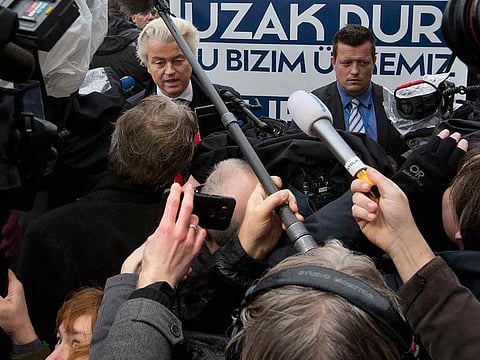As Europe flails, a migrant surge drives its rightward lurch
The EU’s efforts to wrestle with its migrant crisis are a contradictory mess

As more than 1 million refugees, mostly from wars in the Middle East, were flooding into Europe eight years ago, many of them bound for Germany, then-Chancellor Angela Merkel tried to calm her countrymen rattled by the arrivals. “We can handle this,” she said.
Now, at the end of another watershed migration year, it’s clear Europe really cannot handle it.
Across the continent, a spike in asylum seekers has triggered blazing headlines, political upheaval and new rules intended to stanch the influx. It has also contributed to a tilt toward populist and extremist parties in countries where it was previously unimaginable.
As Europe grapples with a shift in its postwar identity — an idea grounded in tolerance, pluralism and collectivism — Merkel’s emollient words ring hollow. And as remarkable as the fallout over migration has been, equally striking is the extent to which the political class and analysts alike have failed to see it coming.
Also Read: Why the UK has it so wrong on refugees
That lapse owes something to polling, in which migration seldom tops European voters’ concerns. But when pollsters record distress over public services, education, housing and the affordability of basic goods, they apparently miss the view, grounded in evidence or not, that surging migration has intensified all those problems.
The most recent example arises in the Netherlands, a small country that punches above its weight; it ranks just 68th by population, according to the World Bank, but trades more with the United States than do France, Italy or Brazil.
Its outperformance stems partly from domestic politics long seen as stable to the point of soporific. That’s what everyone expected from last month’s Dutch elections — another snoozy centrist victory. Except it turned out that everyone was wrong.
Shock waves across Europe
Among those who seemed surprised by the outcome was the top vote-getter, Geert Wilders, a firebrand fixture on the country’s far right for decades. Wilders, who in the past has proposed quitting the European Union and slamming the door on asylum seekers, softened his tone during the campaign.
Whatever the outcome in Amsterdam, the Dutch results have sent shock waves across Europe, already off-balance from right-wing parties that have surged in Germany, France, Austria, Belgium and Greece, as well as far-right blocs that already hold or share power in Italy, Hungary, Finland, Sweden and Slovakia.
This is a Europe that would have been unrecognisable just five years ago. And while the political lurch involves specific national causes and characteristics, it shares in almost every instance a common denominator: a reaction to spiking migration.
Across the continent, neither centrist nor leftist parties have devised an effective response to the gusher of asylum seekers, let alone a long-term strategy that might blunt the far-right’s growing appeal. Without that, the waves of far-right gains might swell to a tsunami.
For now, Europe’s efforts to wrestle with its migrant crisis are a contradictory mess.
One example: The German government helps fund rescue ships in the Mediterranean that, as Italian Prime Minister Giorgia Meloni has bitterly complained, incentivise migrants to make the dangerous sea crossing from North Africa.
Yet many of those migrants dream of making their way to Germany itself, where Chancellor Olaf Scholz has promised to accelerate deportations and cut cash benefits as a way to deter them. As politicians flail, migrant reception centres are overflowing across Europe, along with voters’ frustrations. A continent marked for decades by moderation is being remade before our eyes. — Washington Post
Lee Hockstader is a columnist with expertise in European Affairs
Sign up for the Daily Briefing
Get the latest news and updates straight to your inbox


